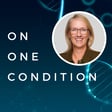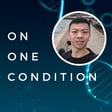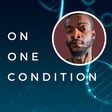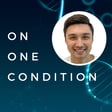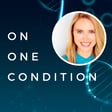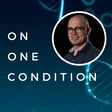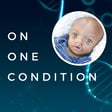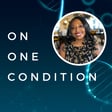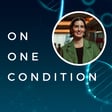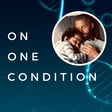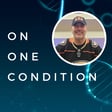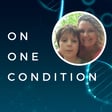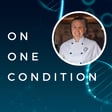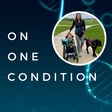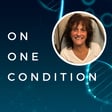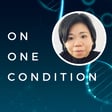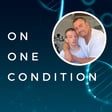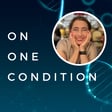Become a Creator today!Start creating today - Share your story with the world!
Start for free
00:00:00
00:00:01

Episode 50: Jen Cueva - Pulmonary Hypertension
Jen shares her journey with pulmonary arterial hypertension (PAH), a condition marked by high blood pressure in the lungs, which severely affects her daily life. She recounts her initial symptoms, eventual diagnosis, and the physical and mental challenges that followed. As a former hospice nurse and caregiver, Jen reflects on her transition to patient, detailing the emotional impact of her increasing dependence on others. She is now an advocate for those with PAH and rare diseases, working to raise awareness and connect people to clinical trials and support networks.
The song that Jen selected is The Climb by Miley Cyrus.
Transcript
Introduction to 'On One Condition'
00:00:00
Speaker
Hi, I'm Sylvain Bertolo, and you're listening to On One Condition, a podcast to raise awareness about health conditions by listening to people who live them every day.
Discussion with Jen Cueva on Pulmonary Arterial Hypertension
00:00:10
Speaker
My guest today is Jen Cueva, and we're going to talk about pulmonary arterial hypertension, also known as PH. Hi, Jen. Thanks for joining me. How are you today? Hi, thank you. I am doing well. Thank you. I am.
00:00:28
Speaker
honored to be here on your podcast.
Appreciation for Rare Disease Advocacy
00:00:30
Speaker
Um, you do such incredible work to share, um, rare disease and voices with others so they can be educated and also aware. So thank you. Well, no, thank you for that. And just for our listeners, I didn't ask you to say that, did I? yeah know you did it ah So I love started starting with a song. Sorry.
The Motivational Influence of Music
00:00:54
Speaker
So which song did you choose and why?
00:00:58
Speaker
I chose the song decline. Most people probably know it's like Miley Cyrus' is song, but for me, it reminds me that there's always one more mountain to climb that I'll get through it. You know, sometimes we may lose sight of what's on the other side, but it's all about decline. So I find that I can relate to that song a lot.
00:01:26
Speaker
Is it because of ah pH or is it because of of life in general? Yeah, pH ph life, managing pH because you know there's always another mountain, another obstacle or struggle in our path, but we just keep fighting and we continue to get to the climb into the other side. it's There's no race to get to the top. It's all about the climb. yeah So that's the part that resonates well with me and managing and pulmonary hypertension.
00:01:55
Speaker
Nice, nice. I don't know that song, so now ah I'll go and listen to it. So I guess I want to start at the beginning of your journey with pH.
Jen's Diagnosis Journey
00:02:11
Speaker
So would you like to tell us when you realized that something wasn't quite right? Yes, so I was working full time as a hospice nurse. It was January of 2005, I thought I had just eaten too much over the holidays and, you know, gained weight because I was getting short of breath, walking, um talking, simple physical activities that I was doing fine before, um including climbing the stairs to my bedroom at night. But unfortunately, it wasn't just that I eat had eaten too much over the holidays. It was
00:02:53
Speaker
pulmonary hypertension and it took multiple hospitalizations um and a few months before I could have an accurate diagnosis finally and that was in February of 2005. So this year will be 20 years since I was diagnosed. But for me as a working full time as a nurse, I was the caregiver, I was a mother, my daughter was young and also a wife and I had so many things that, you know, I thought, well, let's go to the hospital. Something's wrong. I'll get fixed up because that's what happens at the hospitals. Right. And get back to work and with my patients and with my usual life. Um, but unfortunately that wasn't the case for me and my family. Okay.
Impact on Nursing Career and Family
00:03:45
Speaker
Do you mean that because of pH, you had to stop working? Is that right?
00:03:51
Speaker
Yes. So because of pH, the last time I worked as a hospice nurse and nursing was in late January, 2005. And of course that devastated me, not only mentally and emotionally, but financially as well as you could imagine we went from two income households to one income household. so And also my husband,
00:04:18
Speaker
was taking off a lot of time to be with me at the hospitals and trying to figure out what was going on. So there were a lot of not only mental and physical struggles there, but financial struggles as well. Yeah, I can imagine. So I don't know at all what pH does.
00:04:41
Speaker
i I understand like being short of breath is one thing, but having to work to stop working because of that is another thing. So I imagine that it's very severe. Could you tell us a bit more like exactly what kind of short of breathness do you mean and and how does it affect you?
Physical Limitations and Symptoms of PH
00:05:03
Speaker
So when I was having been originally before starting any treatments for PH, I was unable to walk from
00:05:13
Speaker
my couch about 10 steps into my downstairs bathroom um without getting short of breath. I was unable to shower. um you know I was sleeping a lot. um I had to depend on others to do you know things around my house and also help me. I was not only having shortness of breath, but I was having syncope and pre-syncope fainting and fainting episodes, almost fainting falling into walls. um I was unable to drive as well. So these things definitely went into play as no longer being able to work as I was doing before. It took every ounce of energy that I had left just to try to fight the
00:06:09
Speaker
Symptoms that I was doing and get to my appointments because as you can imagine early on Especially early on you're doing undergoing all these um stressful testing and different doctors and you have no clue So it's ways on you mentally and physically and it just sucks all of your energy definitely ah That's incredible And do you know why it has such an impact like from a physiological point of view?
Explaining Pulmonary Hypertension
00:06:43
Speaker
So pulmonary hypertension, I like to explain it almost like a water hose. It is the pulmonary artery that goes from the lungs to the heart to oxygenates your blood. And in pulmonary hypertension, there's like that has like tightness and almost like nothing can get through. So in that time,
00:07:06
Speaker
the right side of your heart is having to work harder. And because of that, the right side of my heart became enlarged. And then I also started to have a lot of swelling in my lower extremities, my abdomen. um And when I first went into the hospital, I had went up about 40 pounds, but majority of that was fluid.
00:07:35
Speaker
um It took quite a while um and lots of diuretics through you know the first few weeks to get that off of me. But even just that difference made a huge impact in my health and my breathing because if you as you can imagine, an extra 30 pounds is quite a bit.
00:07:57
Speaker
Yeah. they Did it happen just like that, or do you know if it was something progressive that eventually built up to to pH? h In my case, it felt like almost it happened over a few months. I'm not sure if it hasn't, if that was the case, because, for example, I can't go to higher elevations without getting altitude sickness, and My husband recalled a time back a few years prior to my diagnosis that we were traveling and I wasn't feeling well when we were going up to a higher elevation. And so I think I could have had some of these symptoms prior, just ah they were not as pronounced. And um these, the other ones just came all at one time. It just hit me.
00:08:56
Speaker
And I was struggling to, you know, even I was crawling up the stairs at night when I got home. And my daughter still remembers that. She's a young adult now, but she wrote an essay about remembering I was diagnosed and crawling up our stairs to get to my bedroom at night. Wow. So we've talked about physical symptoms. Yes.
00:09:23
Speaker
ah Tell me if I'm wrong, but I can imagine that it must be hard for a mental health point of view as well, losing your job, not being able to move as you wish anymore. Did it have any impacts on you? Oh,
Mental Health Challenges of PH
00:09:40
Speaker
definitely. And it continues to impact my mental health. I think something that we forget when diagnosed with a rare disease like pulmonary hypertension is the mental and emotional toll it takes on not only me, but my closest loved ones. And for example, when I was first diagnosed for me, I went into a dark place for a little bit because I was always the caregiver. I was known as taking care of others. I was the nurse. I was the nurse in my family, an extended family in front. And now I was depending on others that needed to help me so that roles were reversed and
00:10:21
Speaker
I definitely wasn't having a liking to this new role of rights. Like I wanted to be the one taking care of others because that's why I went into nursing and not being able to work, not being able to help provide financially for my family, feeling guilty that, you know, I'm using all of these financials to pay for my medical care without helping. um So it takes a toll there as well.
00:10:51
Speaker
Also, of not being able to drive, not being able to help my daughter at things that I was doing prior. um you know It was a lot to not being able to take care of myself, much less my daughter and you know my family. Yeah.
00:11:09
Speaker
Yeah, and it's interesting what you mentioned about the reversing the roles of taking care of people and and then you need to be taken care of. ah So what did you do to care for yourself in a way from a mental health point of view? For me, I had to stop being stubborn and Accept help and remember how it felt giving others help um And that way I it made it a little bit easier for me to accept help still today. I struggle with help um My husband and daughter and close loved ones would be the first ones to tell you I do not like to ask for help But I will ask for help now because I've learned that it helps me not only mentally and physically but
00:12:05
Speaker
It also helps the person that is helping you, right? Because we know how it feels so good to just give to others so we can let others do the same for us. How long did that journey take ah to be able to accept help? The journey continues almost 20 years later, but most days I'm a lot better at not only listening to my body and accepting help,
00:12:33
Speaker
Because I've learned through the years what happens if I don't accept help and if I try to push my body and my limits too much. So it's learning by suffering in a way. Is that right? Definitely. Definitely. It is.
00:12:50
Speaker
Do you think that's something that everyone has to go through, this process of accepting, first of all, that you can't provide, you can't do what you used to do, that you need to be taken care of, and then this process of accepting that you need help and asking for help? Do you think that's a journey everyone has to go through?
00:13:19
Speaker
Oh, most definitely. And I think this that journey is continues like it doesn't stop once you get there because there's a there's days when you think you can do it all and you can't you can't do it all but you try and you learn again the hard way because you're down the next few days and can't do anything. You know, you're resting on the couch using more oxygen. um But definitely it's a journey and it takes everyone different amount of time. And we all process things in a different way. So that acceptance comes at a time, but it it's varied. It's varied. But it definitely is for everyone goes through that acceptance phase for sure. Yeah. Yeah. Can you mention? Is there any treatment that you can take for pH?
PH Treatments and Clinical Trials
00:14:17
Speaker
Yes. therere
00:14:19
Speaker
There are treatments to help minimize the symptoms and recently there have been new treatments coming out and there these new treatments are targeting to actually work on the areas and our lungs and hearts that are are so tight like that water hose and constricted. um So these treatments, new treatments are working in different ways And one just came out earlier this year and we have a few more coming. But for me, when I was first diagnosed, there were only a few different treatments, which one was the IV. So you will be connected 24 seven to a pump that goes right into your, aligned to your heart and continuously pumps that medicine into your body. And if it were,
00:15:15
Speaker
had a problem, my Lion King, if the medicine ran out, you it was an emergency. So you had to get to the hospital quickly and they could help you. And then there were two oral medicines, which I started one of those. And through the years, I'm extremely grateful for our researchers and our healthcare providers and teams that work to better treatments because I've been on all oral medications for now almost 20 years, just about every one of them. But we have now at least 15 different medicines that are helping with our symptoms. There's no cure yet, but I think we'll get there. We're working really good with research and advancements and trying to target exactly what is going on with pulmonary hypertension and what
00:16:15
Speaker
treatments will be effectively treating it in that predicament. Yeah, it's interesting what you're saying about work we're working directly with, um like, imagine that the clinical industry to to get new treatments. Do you have an interest in clinical industry? If I'm not wrong, you took part in a clinical trial, is that right? Correct. I took part in a clinical trial.
00:16:45
Speaker
Unfortunately, I had to drop it early because of my kidney disease. It affected my kidneys and ah took a toll on my kidneys a bit. So we had to I had to leave the trial, unfortunately. But I definitely you know remind others that without these people participating in these clinical trials, we wouldn't get some new treatment. So we definitely need education and awareness around clinical trials and people, um you know, they they're just so lost when it comes to clinical trials. It's a struggle, but I did definitely try to get others and remind them that that's where we get these new treatments from. So um I'm grateful for anyone that signs up. um Unfortunately, there's always inclusions, exclusion criteria,
00:17:43
Speaker
Um, because of my kidneys disease that limits me to a lot of them, but I, um, I, um, I'm all game of fit something that's going to benefit, you know, and better my pulmonary hypertension and also maybe others. And we've become part of working towards a
Setbacks in Clinical Trials
00:18:03
Speaker
cure.
00:18:03
Speaker
Yes, yeah, and I'm always thankful for anyone who takes part in a trial because I think it's a selfless act because at the end of the day you don't you don't know if you're going to actually feel better and from your point of view it sounds like it didn't work and it's a shame but you made that commitment which is very very good of you. It's interesting so I work in the clinical industry and and you hear about dropouts, but you don't necessarily hear the story be behind that. Right. What did it feel like for you to not be able to carry on? I was discouraged, um but I know that my healthcare providers and my team have my best interests at heart and that's what I
00:19:03
Speaker
I have to go with that. And because if my lab works, the blood draws and things, my kidney function was worsening with that. So I was okay with having to stop it because we didn't know if it was going to continue to worsen, right? So I was grateful that I had the opportunity, but discouraged as well because yes, I did have to drop out, but it was because it was affecting, you know, other things like my kidneys.
00:19:33
Speaker
ya Yeah. And do you still keep an eye on what's going on in the clinical industry for pH? I do. I am i keep updated with clinicaltrials.gov as well as reading um medical journals. I attend conferences. um In August, I attended the International Pulmonary Hypertension Association conference, that's every two years, and that was Indianapolis, and talked to a lot of pharmacists, healthcare providers, um everyone that was there, the patients, caregivers, people, the scientists, every everyone from every different area and clinical industry, as well as the healthcare and the patient side were there too.
00:20:27
Speaker
you know, communicate and discuss things like how we can improve things for others to participate in clinical trials and how do we get our information to them. So that was an incredible opportunity that I had there to go and I am always grateful to go to symposiums and read articles and also help others to try to figure out clinical trials but because I also moderate forums that I um help people that come in and have the people don't know, um you know, just the basics, even if clinical trials, for example, if they have to pay for it, that's one of the big things I hear. um So it's always helpful if we all can work towards that education advocating for the clinical trials.
00:21:25
Speaker
Yeah, it's a very good point. And we are here raising awareness about pH, but there is a need to raise awareness with the general public about clinical trials.
Importance of Public Awareness for Clinical Trials
00:21:40
Speaker
I feel like there's a stigma about our industry in a way.
00:21:44
Speaker
um And it's very difficult to shake it off. But I love what you're saying. I fully agree. We need to to raise more awareness with the public. Right. So if if you find a way, let me know. I know I felt like, ah you know, most of the clinical trial teams are trying to work with patients and that patients are the center of their focus. So I ah definitely feel that patients need to be a part of that also um because you know patients are the wins out there, patients are the wins. Like if there's drop-offs, why? Like we need to know those reasons, right? um So it's all about working together as a team. Yeah, yeah.
00:22:34
Speaker
you and It's great to hear your experience of events where you get to meet pharmacists and and others in the in the industry because those exchanges are so important. Definitely. and I think especially for people who work in the industry, hearing it directly from the patient is crucial because ah I'm sure it changes what they think, right and it can't just be from a textbook. It has to be from from hearing stories as well. Definitely. You mentioned clinicaltrials.gov, or others know it as city dot.gov. What's your experience with that? Because ah I've heard many different points of view. Clinicaltrials.gov? Well, I've used it for quite a while.
00:23:30
Speaker
Um, but I also still use it, use a lot of filters because otherwise you would never find the pulmonary. efforts in Um, you know, trials are the ones specifically for me. So, um, usually for me, most people I hear when you're saying, um, their experience, they're overwhelmed when they go to clinical trials.gov and have no clue what to do or where to start. Because if you just put in.
00:23:59
Speaker
a pH or something were real simple, you may get 50,000 pages, right? and And they're not going to go and screen through all that. So I find it helpful if I use a few filters. um And that helps somewhat. But yeah, it definitely still can be overwhelming at times. and But I continue to search it because I i i like the way they have it set up on only because I know like the exclusions, exclusion, who to contact. It has everything there, what six phases they're in um and things like that. So what do you use it for personally? Is it to find new trials or just to keep updated?
00:24:47
Speaker
i I do both. I find new trials and also to keep updated because when I'm talking to others, I do a lot of advocacy work. When I'm talking to others in the PH community, I can tell them, you know, this is something to go truck, go look at this trial. And even if it's own clinical trial that guns and I could search articles somewhere else that may break it down better. I, um,
00:25:17
Speaker
ah often refer them there. um like I refer them to the PH news or PHA sites, places that are geared towards patients in communities. So it's broken down a little better for them to understand it.
00:25:35
Speaker
and Okay. So essentially you you use city dot.gov to find the trials, but then you find in more information in other places. Right. Nice. It's the first time I hear of a real like use case like this. That's great.
Advocacy Efforts and Community Engagement
00:25:51
Speaker
You've talked about advocacy a couple of times. What's your interest in advocacy? but Once I couldn't work, um I decided if I can't do that, I can help others.
00:26:05
Speaker
in other ways. So I started volunteering my advocacy with Pulmonary Hypertension Association. um I was volunteering to contact local Congress people to educate them if there were new bills coming out that regarding health care that needed to be passed and share my story with them as well as sharing my story with others in the PH community. so those people that come later, they can feel less isolated and less alone when they're newly diagnosed and overwhelmed with all these different emotions and not sure what to do. um And now I continue to advocate and also work with um pulmonary hypertension news for, um I write a column, which is weekly,
00:27:03
Speaker
it Has been weekly. I just cut back to every other week for a bit to take a little pause and Also the forums that I am their Moderator for that and that's a community that you can engage with others in the pH community um So with that as well as now I do advocacy part-time as an outreach coordinator for bio news which um that covers 50 plus rare diseases. So I am doing all I can to help others um remember they are not alone, to educate them, to promote awareness, to be the voice you know that others don't want to share their experiences, just so it may help one person. You never know. So if it helps one person, even every day, if it makes an impact, it's worth it to me.
00:28:02
Speaker
i I completely agree with that and I had the exact same ah thoughts when I started the podcast. if If I can help just one person, then I've done something, write from someone else. It's great to hear all the the good work you're doing and your involvement in in advocacy, your interest in new medicines. I really like that.
00:28:32
Speaker
Well, I've really enjoyed our discussion and I'm ashamed in a way that I didn't know more about pH, considering how much impact it has on your life. um And I can completely empathize with the how hard it must be. um If you can't move like you want to, or do you want to, but it sounds great that you've found this involvement with with the PH community and beyond. Yeah, right. I've written magazines as well as, and I've written in a rare disease book earlier this year.
00:29:19
Speaker
um to share my story as well. It was released on Rare Disease Day, which is the last day of February. um That was kaleidoscope. And now I'm working on another book, Positively Rare with another team of rare disease people that have been affected with rare disease. And and all of these things that I'm doing as far as the books and magazines is volunteer, but it goes back to the rare disease communities and hopefully helps touch someone's life and you know they can learn something or grow from it or feel less isolated, whatever it may be. That's wonderful. and I love that. like I feel like the the rare disease community is so strong. um I absolutely love that.
00:30:16
Speaker
um ah I always ask the same question, and the same last question, which I really like. What is your happy place?
Finding Solace at the Beach
00:30:27
Speaker
A place where you feel at peace? My happy place is the beach. So I am fortunate to live in San Diego, California. um I'm about nine, ten miles from the beach, so Um, some days I, if I have a rough day, um, including one day I just was released from the hospital and on the way home, my husband took me to the beach because that's my happy place. I can just close my eyes and listen to the waves and feel the air. And it just takes me to another place and I am just a piece. And then I'm exhausted after a little while, right? Some days I'll just go.
00:31:11
Speaker
you know, with a blanket and read books and that's all. I just want to hear the noises and take in that ocean air and it's just my happy place, definitely. Yeah, well, I couldn't agree more. I love the beach as well. I have such a way of relaxing you. That sounds wonderful. Well, thank you so much, Jen, for your time. I really, really appreciate it.
00:31:39
Speaker
And I wish you all the best for the future. It's been a pleasure and I am grateful that to have this opportunity as well to reach others and share about pulmonary hypertension. So thank you.
